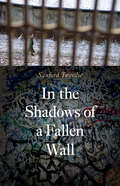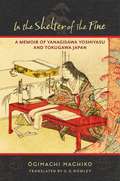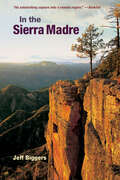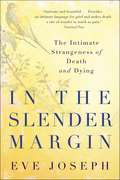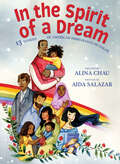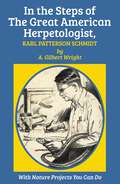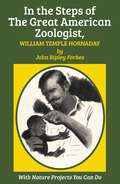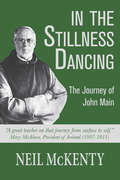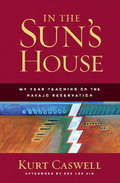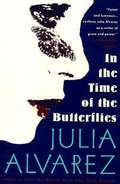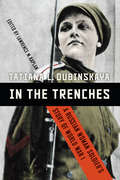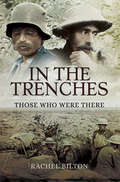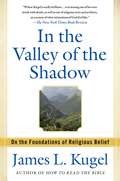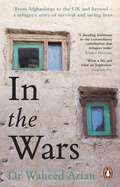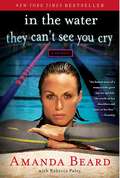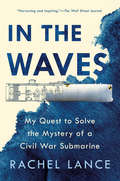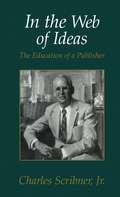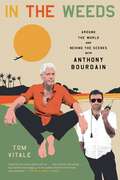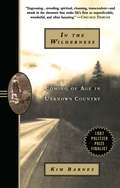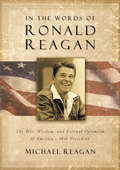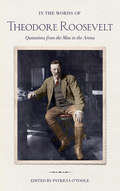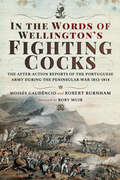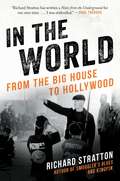- Table View
- List View
In the Shadows of a Fallen Wall
by Sanford TweedieGrowing up, what Sanford Tweedie knew about East Germany was basically . . . nothing. West Germans were our friends; East Germans, the enemy. In 2000, somewhat better informed, Tweedie took advantage of a Fulbright Scholarship to move his family to the eastern German town of Erfurt for the academic year. Far from home and the familiar, with temporary status and a tenuous grasp of the language, he and his wife were curious to see how they would function shorn of all the rules that governed their daily lives—housing, food acquisition, transportation, and even basic communication. As soon as their taxi delivered them to their grim tan and concrete Soviet-vintage apartment building, they knew their education had begun.Learning about life in the former East Germany, amid the feverish embrace of Western culture and the tenacious legacy of a totalitarian past, Tweedie comes to understand the deeper cultural assumptions through which Americans view the larger world. Part travelogue, part history, part cultural critique, all thoroughly engrossing, the story of his yearlong experience is one of dislocation and accommodation, making a German town his own and now ours.
In the Shelter of the Pine: A Memoir of Yanagisawa Yoshiyasu and Tokugawa Japan (Translations from the Asian Classics)
by Ōgimachi MachikoIn the early eighteenth century, the noblewoman Ōgimachi Machiko composed a memoir of Yanagisawa Yoshiyasu, the powerful samurai for whom she had served as a concubine for twenty years. Machiko assisted Yoshiyasu in his ascent to the rank of chief adjutant to the Tokugawa shogun. She kept him in good graces with the imperial court, enabled him to study poetry with aristocratic teachers and have his compositions read by the retired emperor, and gave birth to two of his sons. Writing after Yoshiyasu’s retirement, she recalled it all—from the glittering formal visits of the shogun and his entourage to the passage of the seasons as seen from her apartments in the Yanagisawa mansion.In the Shelter of the Pine is the most significant work of literature by a woman of Japan’s early modern era. Featuring Machiko’s keen eye for detail, strong narrative voice, and polished prose studded with allusions to Chinese and Japanese classics, this memoir sheds light on everything from the social world of the Tokugawa elite to the role of literature in women’s lives. Machiko modeled her story on The Tale of Genji, illustrating how the eleventh-century classic continued to inspire its female readers and provide them with the means to make sense of their experiences. Elegant, poetic, and revealing, In the Shelter of the Pine is a vivid portrait of a distant world and a vital addition to the canon of Japanese literature available in English.
In the Sierra Madre
by Jeff BiggersA stunning history of legendary treasure seekers and enigmatic natives in Mexico's Copper Canyon The Sierra Madre--no other mountain range in the world possesses such a ring of intrigue. In the Sierra Madre is a groundbreaking and extraordinary memoir that chronicles the astonishing history of one of the most famous, yet unknown, regions in the world. Based on his one-year sojourn among the Raramuri/Tarahumara, award-winning journalist Jeff Biggers offers a rare look into the ways of the most resilient indigenous culture in the Americas, the exploits of Mexican mountaineers, and the fascinating parade of argonauts and accidental travelers that has journeyed into the Sierra Madre over centuries. From African explorers, Bohemian friars, Confederate and Irish war deserters, French poets, Boer and Russian commandos, Apache and Mennonite communities, bewildered archaeologists, addled writers, and legendary characters including Antonin Artaud, B. Traven, Sergei Eisenstein, George Patton, Geronimo, and Pancho Villa, Biggers uncovers the remarkable treasures of the Sierra Madre.
In the Slender Margin: The Intimate Strangeness of Death and Dying
by Eve JosephLike Joan Didion's The Year of Magical Thinking, an extraordinarily moving and engaging look at loss and death. Eve Joseph is an award-winning poet who worked for twenty years as a palliative care counselor in a hospice. When she was a young girl, she lost a much older brother, and her experience as a grown woman helping others face death, dying, and grief opens the path for her to recollect and understand his loss in a way she could not as a child. In the Slender Margin is an insider's look at an experience that awaits us all, and that is at once deeply fascinating, frightening, and in modern society shunned. The book is an intimate invitation to consider death and our response to it without fear or morbidity, but rather with wonder and a curious mind. Writing with a poet's precise language and in short meditative chapters leavened with insight, warmth, and occasional humor, Joseph cites her hospice experience as well as the writings of others across generations—from the realms of mythology, psychology, science, religion, history, and literature—to illuminate the many facets of dying and death. Offering examples from cultural traditions, practices, and beliefs from around the world, her book is at once an exploration of the unknowable and a very humane journey through the land of grief.
In the Spirit of a Dream (Digital Read Along): 13 Stories of American Immigrants of Color
by Aida SalazarCelebratory, triumphant, and inspiring, In the Spirit of a Dream is a tribute to American immigrants of color, written in poems and illustrated by 14 first- and second-generation immigrant artists.In the Spirit of a Dream, many immigrants of color set out across continents, oceans, and borders, travelling to the United States in pursuit of opportunity. This book is a celebration of 13 American immigrants of color, from world-famous to local heroes, politicians, surgeons, athletes, activists and more.The biographies included feature engineer and astronaut Anousheh Ansari; Paralympic athlete and entrepreneur Alejandro Albor; surgeon Ayub Khan Ommaya; jazz musician Candido Camero; dancer Conceiçao Damasceno; Sriracha inventor and businessman David Tran; basketball player Dikembe Mutombo; author Edwidge Danticat; politician Ilhan Omar; comic artist Jim Lee; environmental activist Juana Guttierez; cellist Yo-Yo Ma, and the Undocupoets, a group of undocumented poets.These stories are told in poems by Aida Salazar and artwork by Alina Chau, Bianca Diaz, Dion MBD, Fahmida Azim, Gaby D'Alessandro, Jose Ramirez, Ken Daley, Nicole Xu, Paulo D. Campos, Rahele Jomepour Bell, Tracy Guiteau, Vanessa Flores, and Yasmin Imamura.Now available as a digital read along edition with an included audio recording of the text!
In the Steps of The Great American Herpetologist, Karl Patterson Schmidt
by A. Gilbert WrightKarl Patterson Schmidt was one of America&’s most influential naturalists. In his special field of herpetology—the study of reptiles and amphibians—he made fascinating discoveries about the habits of snakes and their environment.This biography follows his exciting career from his boyhood in Lake Forest, Illinois, through his college days at Cornell, his participation in geological expeditions, his first job as a herpetologist at the American Museum of Natural History, and his later expeditions which took him all over the world.As you trace the path of Schmidt&’s career, you can follow his footsteps with a series of fun projects including: Finding Reptiles and Amphibians and Assembling a Scrap Book of Herpetological Pets. All the equipment you need is inexpensive or easily made. With patience and persistence you can find reptiles and amphibians wherever you happen to live.
In the Steps of The Great American Zoologist, William Temple Hornaday
by William Temple HornadayWilliam Temple Hornaday is one of the great figures in the world of natural science. As a very young man he was a famous explorer and collector of zoological specimens from the jungles of Venezuela, Borneo, and India. As chief taxidermist of the Smithsonian Institution he pioneered the art of mounting animals realistically and displaying them in natural settings. Almost single-handedly he preserved the American bison from total extinction. He was the first director of the Bronx Zoo, a post he held for thirty years. At a time when few people in America recognized the need to preserve our natural heritage, he led and advocated for the wildlife conservation movement.This biography is filled with all the adventure and excitement that Hornaday found in his outdoor world, and is accompanied by projects that will allow you to follow in his footsteps as you learn about his trailblazing career path. The projects teach you how to observe the food habits, life cycles, social relationships and homebuilding skills of animals with inexpensive or easily made equipment.
In the Stillness Dancing: The Journey of John Main
by Neil MckentyLong after ordination in 1963, John Main discovered that the form of prayer advocated by the swami already existed within the mainstream of Western Christianity but had fallen into disuse. From then on, he was to devote his life to restoring this form of Christian meditation to its rightful place within the Church. His work began with the foundation of a meditation centre at Ealing Abbey in London and led, some years later, to the foundation of the Benedictine Priory of Montreal and the establishment of a worldwide spiritual family linked through the daily practice of meditation. Neil McKenty paints an attractive portrait of this compelling Irish monk whose teaching and writing on meditation were to transform the lives of thousands of men and women.
In the Sun's House
by Rex Lee Jim Kurt CaswellIn the year he spent teaching at Borrego Pass, a remote Navajo community in northwest New Mexico, Kurt Caswell found himself shunned as persona non grata. His cultural missteps, status as an interloper, and white skin earned him no respect in the classroom or the community-those on the reservation assumed he would come and go like so many teachers had before. But as Caswell attempts to bridge the gap between himself and those who surround him, he finds his calling as a teacher and develops a love for the rich landscape of New Mexico, and manages a hard-won truce between his failings and successes.
In the Sun's House
by Rex Lee Jim Kurt CaswellIn the year he spent teaching at Borrego Pass, a remote Navajo community in northwest New Mexico, Kurt Caswell found himself shunned as persona non grata. His cultural missteps, status as an interloper, and white skin earned him no respect in the classroom or the community-those on the reservation assumed he would come and go like so many teachers had before. But as Caswell attempts to bridge the gap between himself and those who surround him, he finds his calling as a teacher and develops a love for the rich landscape of New Mexico, and manages a hard-won truce between his failings and successes.
In the Sun's House
by Rex Lee Jim Kurt CaswellIn the year he spent teaching at Borrego Pass, a remote Navajo community in northwest New Mexico, Kurt Caswell found himself shunned as persona non grata. His cultural missteps, status as an interloper, and white skin earned him no respect in the classroom or the community-those on the reservation assumed he would come and go like so many teachers had before. But as Caswell attempts to bridge the gap between himself and those who surround him, he finds his calling as a teacher and develops a love for the rich landscape of New Mexico, and manages a hard-won truce between his failings and successes.
In the Time of the Butterflies
by Julia AlvarezSet during the waning days of the Trujillo dictatorship in the Dominican Republica in 1960, this extraordinary novel tells the story of the Mirabal sisters, three young wives and mothers who are assassinated after visiting their jailed husbands. [This text is listed as an example that meets Common Core Standards in English language arts in grades 9-10 at
In the Trenches: A Russian Woman Soldier's Story of World War I
by Tatiana L. DubinskayaTatiana L. Dubinskaya&’s autobiographical novel of life in the Russian army marked the first major work published by a female World War I soldier in the Soviet Union. Often compared to All Quiet on the Western Front, Dubinskaya&’s stark and unsparing story presents a rare look at women in combat and one of the few works of fiction set on the eastern front. Zinaida, a Russian schoolgirl, runs away from home to join the army. Sent to the front, she endures the horrors of trench warfare and the hardships of military life. Undercurrents of revolutionary thinking filter into the ranks as morale begins to crumble. Zinaida must come to grips with the havoc unleashed by the czar&’s overthrow and the new socialist government&’s attempts to impose revolutionary reforms on the army. Destabilization and desertion follow, and her regiment joins the chaotic mass retreat of the Russian army in the summer of 1917. In addition to Dubinskaya&’s original novel, this edition includes selections from her 1936 autobiographical work, Machine Gunner, which she rewrote to satisfy Stalinist censors.
In the Trenches: Those Who Were There
by Rachel BiltonA wide range of personal experiences are covered in the seventeen chapters of this book. All the stories are written by the participants who describe exactly what happened to them while they fought in the greatest battles of the First World War. What makes them special is that their stories were written while the images were fresh in their minds. The experiences recorded are those of civilians, officers and men, in the mud of the Western Front, in the sand of the desert, on the scorching beaches of Gallipoli and on the forgotten front of Salonika. Where possible information about these men has been provided to explain their life before and after the war. Also included are rarely seen images that augment the text.The stories cover the whole of the war, starting with the chance meeting of a reporter and men of the Royal Field Artillery resting after the retreat. Wilfrid Ewart paints a vivid picture of everyday life in the trenches during the first winter of the war. Captain Pollard, a VC winner, provides a grim vignette, breathlessly told, of an infantry charge on a German trench. Sergeant Cooper details life in the French Foreign Legion at Gallipoli and the 'fierce fighting such as men reckless to the point of indifference can execute'. Charles Douie describes the battlefields of the Somme when the guns are silent. The bitter story of the hell endured by the men who bled and died during the battle for Passchendaele is told by A.M. Burrage, ex-Private X. The psychiatric problems of war are clearly outlined by David Phillips and Herbert Read tells of days of fighting, hunger, desperation, loss of life, all thrown away for no gain when the order to evacuate the post was given. Two stories close the war: the first battle between tanks and a poignant description of the end of the war.
In the Valley of the Shadow: On the Foundations of Religious Belief
by James L. KugelTEN YEARS AGO, Harvard professor James Kugel was diagnosed with an aggressive, likely fatal, form of cancer. "I was, of course, disturbed and worried. But the main change in my state of mind was that the background music had suddenly stopped--the music of daily life that's constantly going, the music of infinite time and possibilities. Now suddenly it was gone, replaced by nothing, just silence. There you are, one little person, sitting in the late summer sun, with only a few things left to do." Despite his illness, Kugel was intrigued by this new state of mind and especially the uncanny feeling of human smallness that came with it. There seemed to be something overwhelmingly true about it--and its starkness reminded him of certain themes and motifs he had encountered in his years of studying ancient religions. "This, I remember thinking, was something I should really look into further--if ever I got the chance." In the Valley of the Shadow is the result of that search. In this wide-ranging exploration of different aspects of religion--interspersed with his personal reflections on the course of his own illness--Kugel seeks to uncover what he calls "the starting point of religious consciousness," an ancient "sense of self" and a way of fitting into the world that is quite at odds with the usual one. He tracks these down in accounts written long ago of human meetings with gods and angels, anthropologists' descriptions of the lives of hunter-gatherers, the role of witchcraft in African societies, first-person narratives of religious conversions, as well as the experimental data assembled by contemporary neuroscientists and evolutionary biologists. Though this different sense of how we fit into the world has largely disappeared from our own societies, it can still come back to us as a fleeting state of mind, "when you are just sitting on some park bench somewhere; or at a wedding, while everyone else is dancing and jumping around; or else one day standing in your backyard, as the sun streams down through the trees . . . " Experienced in its fullness, this different way of seeing opens onto a stark, new landscape ordinarily hidden from human eyes. Kugel's look at the whole phenomenon of religious beliefs is a rigorously honest, sometimes skeptical, but ultimately deeply moving affirmation of faith in God. One of our generation's leading biblical scholars has created a powerful meditation on humanity's place in the world and all that matters most in our lives. Believers and doubters alike will be struck by its combination of objective scholarship and poetic insight, which makes for a single, beautifully crafted consideration of life's greatest mystery.
In the Wars: An uplifting, life-enhancing autobiography, a poignant story of the power of resilience
by Dr Waheed ArianAS HEARD ON DESERT ISLAND DISCSAS SEEN ON THE CHANGEMAKERS, a Paramount+ docuseries profiling activists fighting for changeA WATERSTONES PAPERBACK OF THE YEAR'A riveting story of loss, exile, and rebirth.' KHALED HOSSEINI, author of The Kite Runner'One of the most incredible life stories you will ever hear.' JAMES O'BRIEN'A remarkable story. I thought this book was brilliant.' NAGA MUNCHETTY__________Born in war-torn Afghanistan, Waheed Arian's first memories are of bombs. His first-hand experience of the power of medicine inspired him to dedicate his life to healing others. But how does a boy with nothing hope to become a doctor?Fleeing the conflict with his family, he spent much of his childhood in refugee camps in Pakistan, living sometimes ten to a room without basic sanitation or access to education. Waheed largely taught himself, from textbooks bought from street-sellers, and learned English from the BBC World Service.Smuggled to the UK at fifteen with just a hundred dollars in his pocket, he found a job in a shop. He was advised to set his sights on becoming a taxi driver. But the boy from Kabul had bigger ambitions.Working through PTSD and anxiety, he studied all hours to achieve his vocation. He was accepted to read medicine at Cambridge University, Imperial College and Harvard, and went on to become a doctor in the NHS, currently in A&E.But he wanted to do more. In 2015 he founded Arian Teleheal, a pioneering global charity that connects doctors in war zones and low-resource countries with their counterparts in the US, UK, Europe and Australia. Together, learning from each other, they save and change lives - the lives of millions of people just like Waheed.For readers of Educated and War Doctor, this is the extraordinary memoir of a boy who recognized the power of education and dreamed about helping others. It is a tale of courage, ambition and unwavering resilience in the face of all the challenges that life can throw in your way.__________WINNER OF:UNESCO's Global Hero AwardWho Cares Wins Best Doctor AwardThe Times's Man of the Year Award
In the Water They Can't See You Cry: A Memoir
by Rebecca Paley Amanda BeardIn this candid and ultimately uplifting memoir, Olympic medalist Amanda Beard reveals the truth about coming of age in the spotlight, the demons she battled along the way, and the newfound happiness that has proved to be her greatest victory. At the tender age of fourteen, Amanda Beard walked onto the pool deck at the Atlanta Olympics carrying her teddy bear, Harold, and left with two silvers and a gold medal. She competed in three more Olympic games, winning a total of seven medals, and enjoyed a lucrative modeling career on the side. At one point, she was the most downloaded female athlete on the Internet. Yet despite her astonishing career and sex-symbol status, Amanda felt unworthy of all her success. Unaware that she was suffering from clinical depression, she hid the pain beneath a megawatt smile. With no other outlet for her feelings besides the pool, Amanda expressed her emotions through self-destructive behavior. In her late teens and twenties, she became bulimic, abused drugs and alcohol, and started cutting herself. Her low self-esteem led to toxic relationships with high-profile men in the sports world. No one, not even her own parents and friends, knew about the turmoil she was going through. Only when she met her future husband, who discovered her cutting herself, did Amanda realize she needed help. Through her renewed faith in herself; the love of her family; and finally the birth of her baby boy, Blaise, Amanda has transformed her life. In these pages, she speaks frankly about her struggles with depression, the pressures to be thin, and the unhealthy relationships she confused for love. In the Water They Can't See You Cry is a raw, compelling story of a woman who gained the strength to live as bravely out of the water as she did in it.
In the Waves: My Quest to Solve the Mystery of a Civil War Submarine
by Rachel LanceOne of "The Most Fascinating Books WIRED Read in 2020""One part science book, one part historical narrative, one part memoir . . . harrowing and inspiring.&”—The Wall Street Journal How a determined scientist cracked the case of the first successful—and disastrous—submarine attack On the night of February 17, 1864, the tiny Confederate submarine HL Hunley made its way toward the USS Housatonic just outside Charleston harbor. Within a matter of hours, the Union ship&’s stern was blown open in a spray of wood planks. The explosion sank the ship, killing many of its crew. And the submarine, the first ever to be successful in combat, disappeared without a trace. For 131 years the eight-man crew of the HL Hunley lay in their watery graves, undiscovered. When finally raised, the narrow metal vessel revealed a puzzling sight. There was no indication the blast had breached the hull, and all eight men were still seated at their stations—frozen in time after more than a century. Why did it sink? Why did the men die? Archaeologists and conservationists have been studying the boat and the remains for years, and now one woman has the answers. In the Waves is much more than just a military perspective or a technical account. It&’s also the story of Rachel Lance&’s single-minded obsession spanning three years, the story of the extreme highs and lows in her quest to find all the puzzle pieces of the Hunley. Balancing a gripping historical tale and original research with a personal story of professional and private obstacles, In the Waves is an enthralling look at a unique part of the Civil War and the lengths one scientist will go to uncover its secrets.
In the Web of Ideas: The Education of a Publisher
by Charles ScribnerThe publisher recounts his life among the luminaries of America's ""golden age"" of books and authors, including Churchill, Alan Paton, Loren Eiseley, and Albert Einstein, and surveys today's educational system.
In the Weeds: Around the World and Behind the Scenes with Anthony Bourdain
by Tom VitaleAnthony Bourdain's long time director and producer takes readers behind the scenes to reveal the insanity of filming television in some of the most volatile places in the world and what it was like to work with a legend. In the nearly two years since Anthony Bourdain's death, no one else has come close to filling the void he left. His passion for and genuine curiosity about the people and cultures he visited made the world feel smaller and more connected. Despite his affable, confident, and trademark snarky TV persona, the real Tony was intensely private, deeply conflicted about his fame, and an enigma even to those close to him. Tony&’s devoted crew knew him best, and no one else had a front-row seat for as long as his director and producer, Tom Vitale.Over the course of more than a decade traveling together, Tony became a boss, a friend, a hero and, sometimes, a tormentor.In the Weeds takes readers behind the scenes to reveal not just the insanity that went into filming in some of the most far-flung and volatile parts of the world, but what Tony was like unedited and off-camera. From the outside, the job looked like an all-expenses-paid adventure to places like Borneo, Vietnam, Iran, the Democratic Republic of Congo, and Libya. What happened off-camera was far more interesting than what made it to air. The more things went wrong, the better it was for the show. Fortunately, everything fell apart constantly.
In the Wilderness: Coming of Age in Unknown Country
by Kim Barnes<P>Poet Kim Barnes grew up in northern Idaho, in the isolated camps where her father worked as a logger and her mother made a modest but comfortable home for her husband and two children. <P>Their lives were short on material wealth, but long on the riches of family and friendship, and the great sheltering power of the wilderness. <P>But in the mid-1960's, as automation and a declining economy drove more and more loggers out of the wilderness and into despair, Kim's father dug in and determined to stay. It was then the family turned fervently toward Pentecostalism. <P>It was then things changed.In the Wilderness is the poet's own account of a journey toward adulthood against an interior landscape every bit as awesome, as beautiful, and as fraught with hidden peril as the great forest itself. <P>It is a story of how both faith and geography can shape the heart and soul, and of the uncharted territory we all must enter to face our demons. <P>Above all, it is the clear-eyed and moving account of a young woman's coming of terms with her family, her homeland, her spirituality, and herself. <P>In presenting Kim Barnes the 1995 PENJerard Fund Award for a work-in-progress by an emerging female writer, the panel of judges wrote that "In the Wilderness is far more than a personal memoir," adding that it stands "almost as a cautionary example of the power of good prose to distinguish whatever it touches." <P>Indeed, In the Wilderness is an extraordinary work, courageous, candid, and exquisitely written.
In the Words of Ronald Reagan: The Wit, Wisdom, and Eternal Optimism of America's 40th President
by Michael ReaganThis collection of Reagan’s words and writings—both public and private—offers an intimate portrait of the president, actor, icon, and family man.As one of America’s greatest presidents, Ronald Wilson Reagan succeeded in renewing pride in our country, and strengthening the principles of family, faith, and freedom on which it was founded. President Reagan endeared himself even to his political opponents with his self-effacing wit and irrepressible optimism. Inspiring, thoughtful, and at times downright funny, he had a gift for stirring emotion, sparking debate, and calling a nation to action.Ronald Reagan’s oldest son Michael has gathered a wonderful collection of his father’s public and private words, from hilarious one-liners to eloquent letters to intimate family moments. Complemented by Michael Reagan’s personal and insightful commentary on his father’s life, In The Words of Ronald Reagan will delight you, inspire you, and motivate you to finish the job Reagan began—the job of rebuilding the American dream.
In the Words of Theodore Roosevelt: Quotations from the Man in the Arena
by Theodore Roosevelt Patricia O'TooleThe public life of Theodore Roosevelt (1858-1919) was marked by his service as the twenty-sixth President of the United States, Vice President, Governor of New York State, Assistant Secretary of the Navy, U.S. Civil Service Commissioner, President of the New York City Police Commission, and New York State Assemblyman. In his life outside of government he was famous as an author, naturalist, rancher, big game hunter, and explorer. The twentieth century would become known as the American Century, and it was Theodore Roosevelt, through his foreign policy, who ushered the United States into the ranks of the world's great powers. In domestic affairs, he used his presidential powers to level the playing field between capital and labor, to protect consumers, and to establish a conservation program that was far-sighted and comprehensive, covering the nation's natural resources, its wilderness areas, its endangered species, its scenic beauty, and the cultural artifacts of its indigenous peoples.Distilled from Roosevelt's voluminous writings and speeches, In the Words of Theodore Roosevelt is a discerning collection of quotations by this American icon who continues to inspire and captivate an extraordinary array of twenty-first-century Americans. Carefully selected and organized by topic by Patricia O'Toole, these quotations reflect the vast range of Roosevelt's interests, the depth of his wisdom, his almost superhuman energy, and his directness. Many of the issues that Roosevelt addressed-from America's international role to the environment-remain pressing concerns today, giving his century-old words remarkable currency. This singular collection of quotations-enhanced by O'Toole's illuminating introductory essay, notes on biographical and historical context, and bibliographies of Roosevelt's writings-is a trove for writers, teachers, students, and all who recognize Theodore Roosevelt's unique role in U.S. history.
In the Words of Wellington's Fighting Cocks: The After-action Reports of the Portuguese Army during the Peninsular War 1812–1814
by Moisés GaudêncioThe literature of the Peninsular War is rich with vivid source material – letters, diaries, memoirs, and dispatches – but most of it was written by British soldiers or by the French and their allies. As a result the history and experience of the Portuguese forces – which by 1812 composed close to half of Wellington’s Army – have been seriously under-represented. That is why this pioneering book, which publishes for the first time in English the after-action reports written by the commanders of Portuguese battalions, regiments and brigades, is so important. For these detailed, graphic firsthand accounts give us a fascinating insight into the vital contribution the Portuguese made to the allied army and shed new light on the struggle against the French in the Iberian Peninsula. The authors provide an introduction tracing the history of the Portuguese Army prior to the Salamanca campaign of 1812, while tracking its organizational changes and assignment of commanders from 1808 to 1814. They include detailed notes on the after-action reports which set them in the context of each stage of the conflict.
In the World: From the Big House to Hollywood (Cannabis Americana: Remembrance of the War on Plants, Book 3) (Cannabis Americana: Remembrance of the W #3)
by Richard StrattonThe Hollywood Ending of an Adrenaline-Filled and, By Turns, Harrowing and Funny Odyssey of Crime and Redemption in America's War on DrugsSmuggler's Blues, the first book in Richard Stratton's memoir of his criminal career, detailed his years as a kingpin in the Hippie Mafia. Kingpin, the second book, traced his eight-year journey through the criminal justice system, through two federal trials and myriad jails and prisons, and culminating in his success as a self-taught jailhouse lawyer in winning his own release. In this final volume, Stratton recounts his return to civilian life, as a convicted felon who had been forced to confront his demons and an aspiring writer who yearned to make his mark. From parole to Hollywood to marriage and fatherhood, he found his way in the free world. Working in the New York office of a criminal defense attorney, he somehow adhered to the stringent conditions of his release not to associate with other felons. When his prison novel Smack Goddess was published, his mentor, Norman Mailer, entered his life again. Going to Hollywood to consult on a documentary, he became a writer and producer, and his feature film Slam won major awards at Sundance and Cannes. In the World includes profiles of celebrities such as Mailer, Oliver Stone, Sean Penn, and others.
